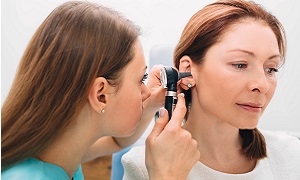Ruptured Eardrum
Your eardrum is a thin tissue that separates your ear canal from the middle ear. A ruptured eardrum, which is also termed as a perforated tympanic membrane, is a hole or a tear in the eardrum.
A ruptured eardrum may lead to multiple complications such as middle ear infections and hearing loss. It might also require surgery for repairing the damage to the eardrum. However, if you protect your ear, a ruptured eardrum may heal on its own, without any treatment within a few months.
Symptoms
A ruptured eardrum might have multiple symptoms such as:
- Mucuslike, pus-filled or bloody drainage from the ear
- Ear pain that can subside quickly
- Hearing loss
- Ringing in your ear i.e. tinnitus
- Spinning sensation i.e. vertigo
- Nausea or vomiting resulting from vertigo
If you experience signs or symptoms of a ruptured eardrum, it is essential to inform your doctor. It is important to determine the cause of the symptoms as well as find out whether a ruptured eardrum has occurred.
Causes
Several causes might lead to a ruptured eardrum. Some of the most common causes leading to this condition include:
- Infection is generally the most common cause. The infection may be caused by viruses, bacteria, or fungi infecting the inner ear and/or Eustachian tube, which exerts pressure on the eardrum as well as stretches it. The eardrum may perforate, depending upon the amount of pressure that is put on it.
- Sports injuries which can include any head trauma
- Poor technique of irrigation of the ear canal for removal of earwax
- Trauma
- Other blast waves such as fireworks, gunshots, or any type of explosives
- Car accidents
- Rapid changes in the atmospheric pressure, for example, barotrauma from scuba diving or even from explosives producing a blast wave.
- Sticking a sharp object into the ear canal or even dull objects such as cotton-tipped swabs to remove earwax can also lead to this condition
- Surgical placement of tubes in the ear i.e. myringotomy.
Diagnosis
Generally, an ENT specialist will perform a diagnosis to see if you have a ruptured eardrum. Generally, he/she might use a lighted instrument which can be an otoscope or a microscope.
He/she can conduct additional tests as well for determining the cause of your symptoms or detecting the presence of any hearing loss. Some of the tests may include:
Laboratory tests
Tuning fork evaluation
Tuning forks are two-pronged, metal instruments, and they produce a sound when struck. With simple tests with these instruments, your doctor can detect hearing loss.
A tuning fork evaluation might also reveal if your hearing loss is caused by damage to the vibrating parts of your middle ear, including your eardrum, or any damage to any sensors or nerves of your inner ear, or damage to both.
Audiology exam
Treatment
In most cases, ruptured eardrums heal without any treatment within a few weeks. If there is any evidence of infection, your doctor might prescribe antibiotics. If the tear or hole in the eardrum doesn’t heal by itself, then your doctor is going to recommend treatment. Treatment can include the following:
Eardrum patch
If the tear or hole in the eardrum is not closing on its own, your ENT specialist might seal it with a paper patch, or a patch made of other material. During the procedure, your doctor might also apply chemicals to the edges of the tear, which can help the eardrum to heal itself. After this is done, he/she is going to apply a patch over the hole. This procedure might need to be repeated more than once before the holes close on their own.
Surgery
If a patch is unable to help you with proper healing or your ENT specialist determines that the tear is not likely to heal with a patch, he/ she may recommend surgery. The most common surgical procedure for a ruptured eardrum is tympanoplasty. This procedure involves your surgeon grafting a patch of your own tissue to close the hole in the eardrum. This procedure is generally done on an outpatient basis. In an outpatient procedure, generally, you are able to go home the same day unless due to medical anesthesia conditions, a longer hospital stay is required.
Complications
Your eardrum or tympanic membrane has two important functions, which includes hearing as well as protection.
The complications that can result from a ruptured eardrum include:
- Hearing loss- Hearing loss is usually temporary and lasts only until the tear or hole in your eardrum has healed fully. The size as well as the location of the tear may affect the degree of hearing loss.
- Middle ear infection- A ruptured or perforated eardrum is able to allow bacteria to enter your ear. If a perforated eardrum is not able to heal, you might become vulnerable to infections. This can lead to the occurrence of chronic drainage and hearing loss as well.
- Middle ear cyst- Although rare, this cyst, which is composed of skin cells and other debris, might develop in your middle ear as a long-term result of eardrum rupture.
Prevention
Some of the tips that you can follow in order to avoid a ruptured eardrum include getting proper treatment for middle ear infections, whenever you see signs of symptoms. You should also guard your ears against any explosive noise. Remember to keep your ears free of any foreign objects as well, and avoid digging out excess earwax using paper clips, cotton swabs, and similar items. Such items might tear or puncture the eardrum.
Avoid flying if you are having a cold or active allergy that is causing nasal or ear congestion.



